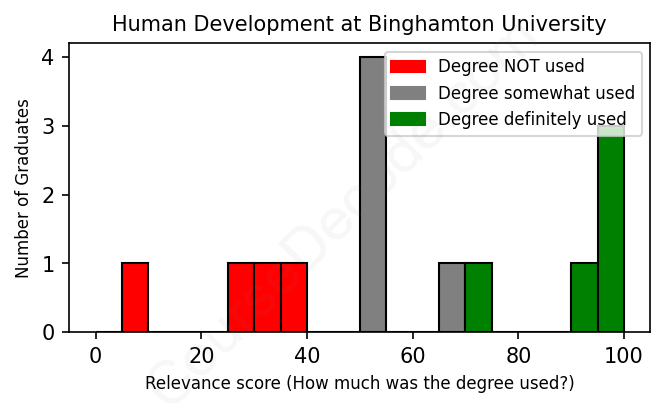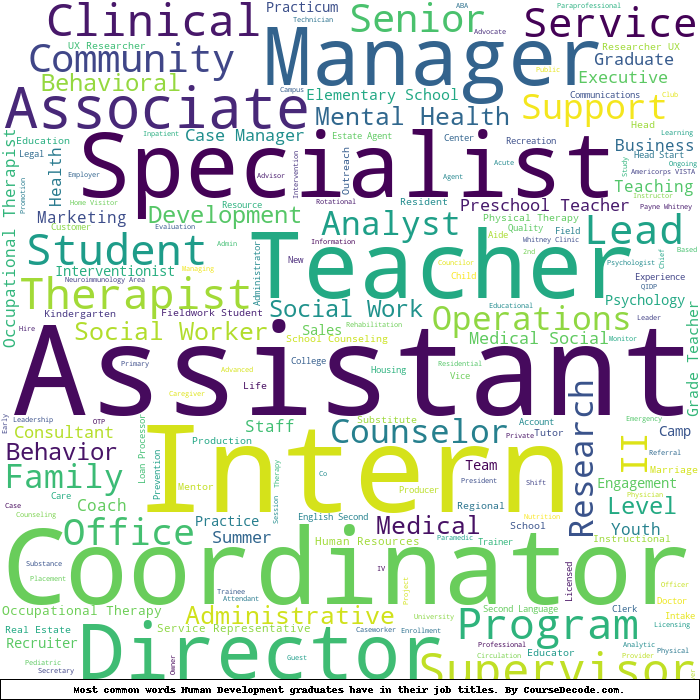
First, some facts. Of the Human Development graduates from Binghamton University we've analyzed , here's how many have used (or NOT used) their degree in their career:

These are estimates based on AI analysis of 14 LinkedIn profiles (see below).
The verdict? Below average. Overall, with an average relevance score of 59%, Human Development graduates from Binghamton University have a lower likelihood (-8%) of finding work in this field compared to the average graduate across all fields:
And for comparison, here's the chart for all profiles we've looked at across all degrees.
Also, after graduating, only 21% of these graduates have pursued further education other than another Bachelor's degree (such as a Masters degree or other), compared to the average across all profiles of 35%. This suggests a Bachelors degree is enough for most Human Development graduates, and it's normal to look for work straight after graduation.
See the details:
|
Relevance score: 100% We think this person has gone into a career highly relevant to their degree. We think this person has gone into a career highly relevant to their degree.
DEGREE INFOGraduated in 2021 from Binghamton University with a Bachelor of Arts - BA in Human Development. No other secondary education since. JOB HISTORY SINCE GRADUATIONStudent Intern HCA - Helping Celebrate Abilities Feb 2021 - Present ABOUTNo information provided. |
The top 10 most common jobs done by the graduates we've analyzed (ranked most common to least) are:
After looking at the job paths of graduates from Binghamton University's Human Development program, it seems like a lot of them ended up in roles that don’t directly relate to what they studied. You’ve got people doing administrative work, marketing, and even some acting gigs. Positions like administrative assistants, office managers, and even roles in the finance sector, like at Goldman Sachs, are pretty common. These jobs often focus more on general skills rather than the specific human development knowledge they might have gained during their studies.
On the flip side, there are definitely some exceptions where graduates have found jobs closely aligned with their degree. Roles like a Companion Caregiver or a Caseworker at a social services department apply those core principles of human development directly. Internships in mental health settings, diversity and inclusion initiatives, and educational support also show a solid connection to the Human Development background. Overall, while it looks like many graduates are in unrelated fields, there’s a fair number who are successfully applying their studies in meaningful roles that impact people's lives.
Here is a visual representation of the most common words in job titles for Human Development graduates (this is across all Human Development graduates we've analyzed, not just those who went to Binghamton University):

When you look at the career paths of Binghamton University Human Development graduates, it seems like they start off with a mix of roles, many of which are somewhat related to the field. For their first jobs, you’ll see positions like administrative assistants, interns in various capacities, or roles that involve direct interaction with people, like caregiving or social services. Over time, though, there’s a pretty clear trend: while some folks stick to human development-related careers, others venture into quite different fields, particularly in business and marketing. This shows a bit of versatility, but for those wanting a career closely tied to Human Development, it might feel like a missed opportunity. A good number seem to transition into more corporate environments, working in roles like business development or marketing directors, especially after a few years.
If we look five to ten years down the line, many graduates appear to climb the career ladder, but not always within their original field of study. Those who keep their focus on human services, like social work, may find themselves in stable positions, such as caseworkers or program coordinators. In contrast, several others find success in business roles, including high-level positions at major companies. However, there’s a noticeable chunk who may not be directly using their degree in meaningful ways, leading to careers that are somewhat disconnected from what they learned at Binghamton. Overall, it feels like this degree offers a wide range of options, but also a bit of uncertainty in terms of staying true to the Human Development pathway. It's a mixed bag, really, with some thriving and others potentially feeling lost in the shuffle.
Honestly, a Bachelor's degree in Human Development can be a mix of challenging and manageable, and it really depends on your interests and strengths. At Binghamton University, you’ll dive into topics like psychology, sociology, and even some education, which can be super interesting if you enjoy learning about how people grow and interact. Some students find the coursework engaging and insightful, making it easier to stay motivated, while others might struggle a bit with the theoretical stuff or the research projects. Overall, it’s not considered one of the toughest degrees out there, but you’ll definitely need to be dedicated and put in the effort to get through the core classes and assignments. If you’re passionate about the subject, you might even find it pretty enjoyable!
Most commonly, in the LinkedIn profiles we've looked at, it takes people 4 years to finish a Bachelor degree in Human Development.
So, looking at this group of Binghamton University grads, it seems like the salary situation is all over the place. Some folks, like the one who started at Goldman Sachs and climbed up to director-level roles, probably raked in some serious cash compared to others who’ve taken on jobs in caregiving or administrative roles, which typically offer lower pay. Many of the early career positions, especially the internships and assistant roles, likely didn’t pay a ton. However, you can see some folks moving into better-paying positions as they gain experience, particularly in marketing and finance. Overall, it looks like they have potential to make decent money later on, but some definitely start off on the lower end of the pay scale.
Here is a visual representation of the most common words seen in the "about" section of LinkedIn profiles who have a Bachelor degree in Human Development (this is across all Human Development graduates we've analyzed, not just those who went to Binghamton University). This may or may not be useful:

Here are all colleges offering a Bachelor degree in Human Development (ordered by the average relevance score of their Human Development graduates, best to worst) where we have analyzed at least 10 of their graduates:
| College | Score | Count |
|---|---|---|
 Virginia Tech Virginia Tech
|
81 | 12 |
 University of California, Davis University of California, Davis
|
61 | 13 |
 Binghamton University Binghamton University
|
59 | 14 |